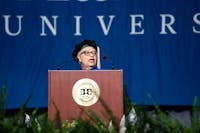Learning can happen outside the classroom
With the Justice Brandeis Semester under discussion, experiential learning is on many people's minds. According to the international nonprofit Association for Experiential Education, experiential learning is "a philosophy and methodology in which educators purposefully engage with learners in direct experience and focused reflection in order to increase knowledge, develop skills and clarify values." In other words, you learn about something, and then you go do it. Then you think about what you did. An example of experiential learning would be to take a class in banking, work for Bank of America and then write a paper or give a presentation on what was learned. This style of pedagogy values both what can be learned in the classroom and what can be learned outside of it. Experiential learning is an excellent concept for students facing the job market. Outside experience can easily lead to employment. According to the National Association of College and Employers, 30.7 percent of new hires came from an internship program within the company and 60 percent of new hires had internship experience. Last year, Northeastern's experiential learning program placed students with the International Monetary Fund, Microsoft and Children's Hospital Boston. With a tight job market, having a meaningful internship may be the key to getting a job.
Experiential learning can take the internship experience to another level. By involving course work related to the field and a program-based paper or presentation, students can take what they saw as an intern and turn it into a reflective learning experience. There is no better way to learn about the good and bad parts of a job or service than by having to deal with those parts on a daily basis. What is abstract in the lecture hall becomes real.
That said, experiential learning does not have to be an alternative to the lecture hall or the liberal arts education. It is at its best when it complements coursework by providing another source of learning. Basic educational psychology shows that information can be taken in by a variety of ways: seeing, hearing, and doing. You get the "seeing" from reading and visual aids in lectures. You get the "hearing" from lectures. Discussion sections offer a sort of "learning by doing." Experiential learning enriches the "doing" sort of learning.
Furthermore, a liberal arts education allows students to experiment. Students can see if they enjoy Classics, Anthropology, Physics or Psychology. Similarly, experiential learning allows students to try out different careers. It is a win-win situation regardless of the outcome. If students like their internships, the advantage of a likely chance of obtaining employment mentioned earlier kicks in. If a student totally hates the field they are working in, then he learns a little bit about what career he may want to pursue. Either way, the process leads to self-discovery.
Experiential learning provides a way for alumni and students to connect. By taking in a student participating in an experiential learning program, alumni can help their alma mater. Johns Hopkins University is a case in point. The Society of Engineering Alumni at Hopkins provides funding and support for students searching for an engineering internship. Another group of alumni at Hopkins provides $5,000 for nonprofit internship programs.
Communities benefit from universities with experiential learning programs. Wagner College in New York City has a "Civic Innovation Program" which focuses on helping disadvantaged youth in New York City. The program focuses on student collaboration with youth organizations to enhance the lives of children. According to Wagner's Web site, 1,200 Wagner students reach 8,000 kids each year. Wagner also provides a certificate program in Civic Engagement for students who are committed to giving back. A socially aware university like Brandeis could learn something from Wagner.
Experiential learning has a social value beyond the benefits it provides to public service organizations with internship programs. Some universities have given students credit for the jobs they hold outside of the school. For example, Old Dominion University gives students various ways that don't only include traditional coursework to prove competency so they may take higher-level courses. By approaching learning in this way, barriers to learning are removed while quality of education is assured.
There are many ways to learn about the world. An experiential learning program that connects the job experience with the classroom would be a boon for our University. Students would see how classroom discussion applies beyond the spirit of theory. The University would strengthen old relationships and develop new ones with the community. These relationships could provide a social value-whether it is helping a nontraditional student pursue education or aiding an overwhelmed social program with enthusiastic Brandeis students. An experiential learning program would add value to Brandeis University as an institution of ideas and as a community of scholars connecting to students.



Please note All comments are eligible for publication in The Justice.